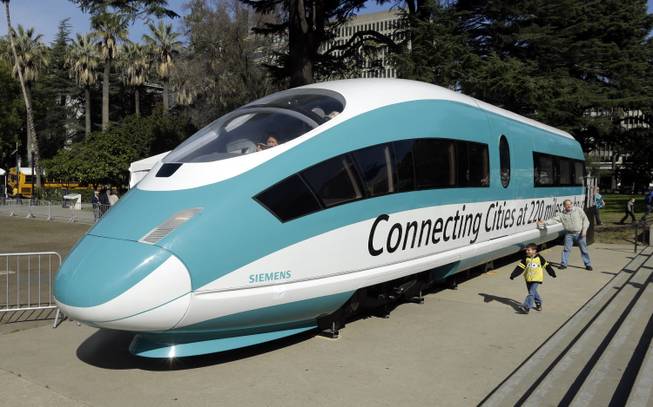
Rich Pedroncelli / AP
This Feb. 26, 2015, photo shows a full-scale mock-up of a high-speed train, displayed at the Capitol in Sacramento, Calif.
Tuesday, Jan. 16, 2018 | 4:51 p.m.
SACRAMENTO, Calif. — The estimated cost for the first phase of California's bullet train climbed by 35 percent on Tuesday to $10.6 billion, the latest increase for the ambitious project to run a high-speed rail line from San Francisco to Los Angeles.
The $2.8 billion price hike for a 119-mile (191-kilometer) segment in the Central Valley puts the entire cost of the project at roughly $67 billion, although officials said they hope to recover the newly announced costs later. It was projected to cost $40 billion in 2008 when voters approved bond financing.
"I want the public to count on us to tell the truth, whether it's good, bad or ugly," said Dan Richard, chair of the California High Speed Rail Authority's board. "We're going to do every single thing in our power to drive these costs down."
Some of the fresh costs stem from trouble acquiring the rights of way for the track in the Central Valley. The authority entered into construction contracts before fully securing rights of way in all areas, a decision officials said they wouldn't make again. The decision to enter into contracts quickly was partly due to the need to spend $2.5 billion in federal stimulus money by last fall.
"Much of today was a lessons learned expression," said Brian Kelly, the state's current transportation secretary who was named as the authority's new chief executive Tuesday. "Because they learned these things the hard way on the early contracts they will not repeat them on the later contracts."
Critics seized on the news at the latest evidence the project is destined for failure.
"We now have a set of facts that is so clear that this authority simply is unable to produce the project, and making it up as they go along simply is not a sane approach," said Republican Assemblyman Jim Patterson of Fresno, a city at the heart of the Central Valley train segment. He's asked the Legislature to initiate an audit of the rail authority.
A 2008 ballot measure passed by voters promised a train that would run from San Francisco to Los Angeles in under three hours by 2029, with the track eventually expanding to Sacramento and San Diego.
In October the rail board approved a $30 million contract with DB Engineering & Consulting USA, the U.S. arm of German rail giant Deutsche Bahn AG to design and operate the train from the Central Valley to the Silicon Valley in its early stages.
A fresh estimate on overall costs and possibly the timeline will be included in a business plan the authority must submit to lawmakers this spring. Beyond the bond and federal dollars, money for the train comes from California's cap-and-trade program that taxes carbon emissions.
Outgoing Democratic Gov. Jerry Brown has been a champion of the project because it will be a cleaner and more efficient transportation option.
The candidates vying to replace him have a variety of perspectives on the bullet train, with some arguing it needs a better financing plan. The Legislature may also get a one-time chance in 2024 to reallocate how cap and trade money is spent, which could hurt the rail project depending on the makeup of the Legislature.
Some of that uncertainty made it difficult to recruit a new chief executive after Jeff Morales left the job last summer after five years. Kelly will start the new job next month at a salary of nearly $385,000.
Richard, the board chairman, acknowledged the new governor will need certainty on the project's financing and timeline.
"I do feel that owe it to the next governor to provide a complete package to them of what this program looks like," he said. "I'd like to not have a lot of loose ends when we get to that point."
